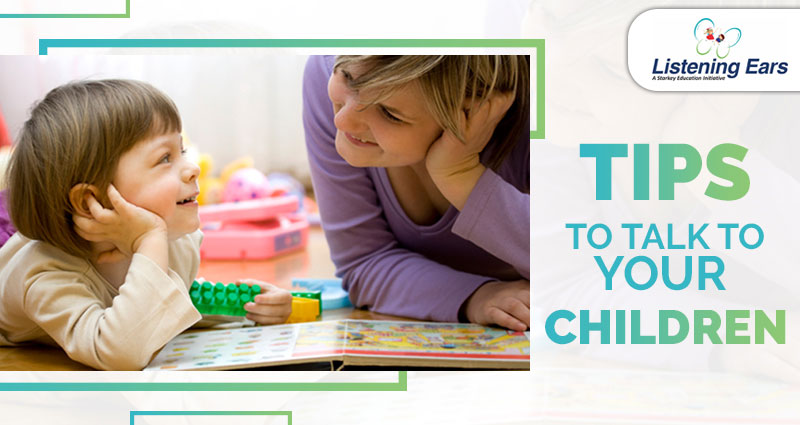Why Reading with Children Is Important
July 9, 2019Stimming Behavior in Autism
July 24, 2019
- Maintain eye contact. It is important to get down to the child’s level when talking because it establishes connection with the child, and sends a signal that you’re interested.
- Use your child’s name. Your own name is music to your ears. Calling the child’s name helps in getting their attention before delivering your message.
- Keep it simple. Young kids have trouble following too many directions given at once. Break down the task/ instructions to simpler chunks, depending on the child’s level of understanding.
- Lot of repetitions– Be repetitive with your sentences and words. Use the same words in different contexts multiple times. The more your child hears the word, the more likely he is to relate to it and remember it.
- Talk about what they’re seeing and trying to say – When the child is trying to say something, talk about it. Talk about what interests them.
- Expand their sentences – The child may use very basic words. Add on more words, sentences and information to it. Example, a child may say- “baby crying”. You can say – “yes, baby is crying. He must be hungry”.
- Use age appropriate sentences – Understand the child’s level of understanding first and use words/ sentences accordingly.
- Turn every activity into a talking activity- You can talk about many, many things during their bathing time, feeding, dressing etc. Every situation has plenty of language stimulation you can provide. All you need to do is TALK.
- Read to your child- Simple books with lot of illustrations will kindle excitement and interest in your child.
- Give opportunities by asking open-ended questions. This will open up your child’s mind and it will get them thinking. More open – ended questions will have the child thinking and talking more.
- Reinforce and reward- Say, “wow”, “awesome”, or “good words” when a child says something impressive. Reinforcing will only lead to the child to do better.
- Be gentle but firm. If you have made your decision about something, stand by it. The child may revolt against it, but eventually they may have no other choice.
- Make time for one-on-one conversations. Try to get some one-on-one time with your kids at different times so you can talk at their level and use appropriate vocabulary. It might be while walking to the park, reading a book together before bed. It doesn’t have to be structured time, but take advantage of opportunities for quality time as they arise.
- Don’t interrupt. Try not to interrupt or scold your kids when they are telling you a story. Kids will lose interest in sharing their feelings with you if you shift away from their story and lecture them instead. For example – A child is sharing a story about he and his friends playing near the pool. Wait till the child finishes the story and explain about the dangers of playing alone near the water and how adult supervision is necessary. Do not start disciplining the child whilst his narration.
- how acceptance. When you show your kids that you accept and love them just the way they are despite their differences, they will be more likely to share their feelings and problems with you.






